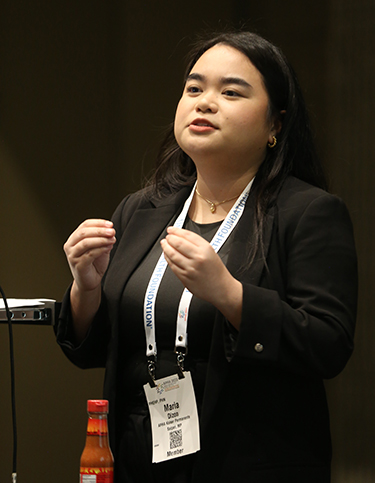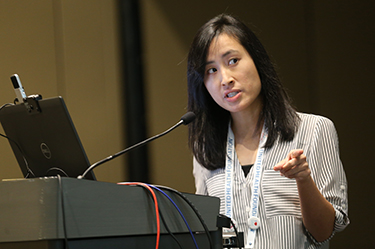The future of public health was on display Monday as 12 young professionals presented projects they had worked on over the past year, with support from APHA and Kaiser Permanente community health partners.
Launched in 2021, the APHA-Kaiser Permanente Community Health Fellowship Program supports development of a diverse group of public health leaders committed to improving the health of vulnerable communities and achieving health equity for all. The program is geared toward first-generation college graduates, people of color and those from lower socioeconomic backgrounds. 1
Fellows support and lead projects, programs and partnerships to address upstream determinants of health across Kaiser Permanente-served communities. Focus areas may include housing and homelessness, food security, economic opportunity, education, racism and related trauma, environmental health and sustainability, and access to health care services.
During the program, fellows receive mentorship, professional development, coaching and workforce training. Each of the 12 fellows in the 2022-2023 class received a $120,000 stipend for the 12-month program, which runs September to August.
“Our fellows and scholars are a testament to the need for diverse voices in the realm of public health, and the Program is honored to be a part of uplifting and supporting them toward careers as future public health leaders,” Eileen Lavelle, APHA’s fellowship program manager, said in an interview with The Nation’s Health.
One project was led by Maria Dizon. A first-generation college student, she graduated in 2019 from Portland State University with a degree in community health. She then earned an MPH at Portland State University. As a fellow, she was placed at the Hawaii Public Health Institute in Honolulu.
Dizon wanted to help tighten regulations in Hawaii on the tobacco industry’s marketing strategies involving flavored tobacco products.
“How can we ensure the policy environment will reduce the burden of tobacco-related health issues?” she asked.
Studies show that vaping is rising among young people in Hawaii. Dizon highlighted the aggressive marketing tactics. For example, the industry has introduced “island” flavors for e-cigarettes, which make the products more appealing to young Hawaiians. The tobacco industry is also adept at fighting and delaying regulatory policies.
In May, Dizon learned that a House-Senate conference committee agreed to tax and regulate vaping devices and vaping liquids as they do other tobacco products. Meanwhile, Dizon continues to push passage of H.B. 551, a bill that would end the sale of flavored tobacco products.
 Jessica Tran was placed at Grady Health System in Atlanta. For her fellowship, she wanted to develop a health screening process involving social determinants of health. Some patients at Grady University were surveyed on their exposure to SDOHs. This resulted in offering them more reliable transportation to medical visits and a text message campaign to remind patients of on-site enrollment assistance in the Supplemental Assistance Nutrition Program. Over 3,000 patients received help through the program.
Jessica Tran was placed at Grady Health System in Atlanta. For her fellowship, she wanted to develop a health screening process involving social determinants of health. Some patients at Grady University were surveyed on their exposure to SDOHs. This resulted in offering them more reliable transportation to medical visits and a text message campaign to remind patients of on-site enrollment assistance in the Supplemental Assistance Nutrition Program. Over 3,000 patients received help through the program.
Applications are now open for the 2024-2025 scholarship. Apply by Jan. 4, 2024. For questions email scholarships@apha.org.
Photos: Maria Dizon; Jessica Tran. Photos courtesy EZ Event Photography.